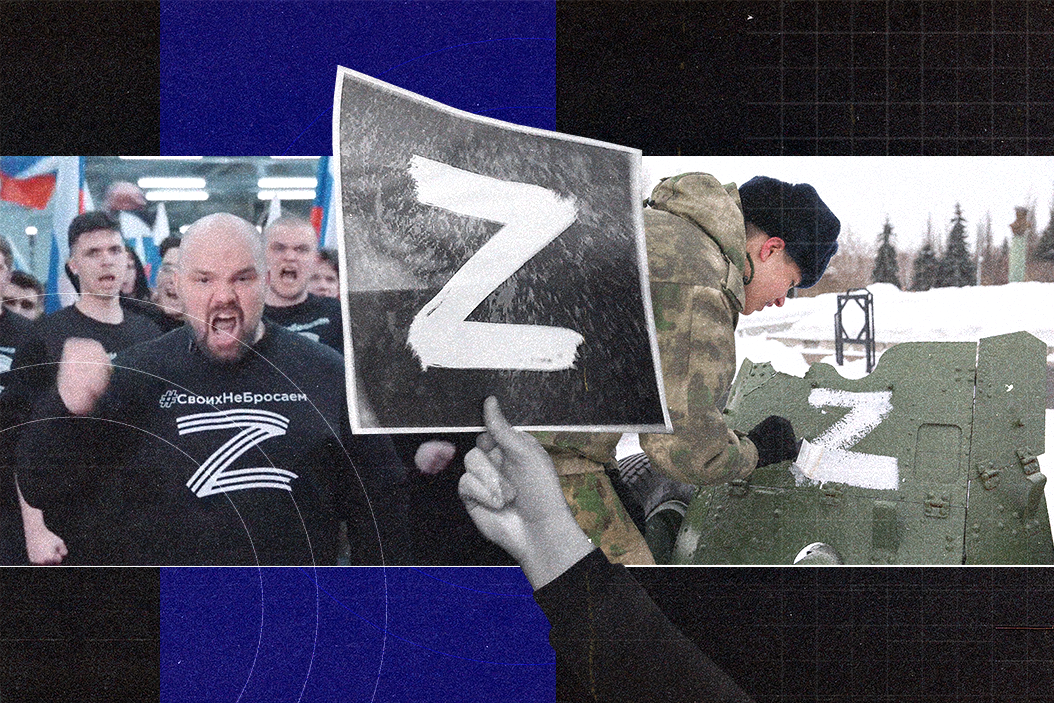What’s Z deal with that Russian symbol?
Russian gymnast Ivan Kuliak was widely criticized for taking to the podium of a World Cup event over the weekend with the letter “Z” taped to his leotard. Why? Well, since Putin ordered his armies into Ukraine two weeks ago, the Roman letter Z — often rendered in a paintbrush style — has become a symbol of support for the invasion and for Putin’s regime. In Russia, it’s been slapped on cars, drawn on lapels, and even emblazoned on the sweatshirts of the guys in this super chill “non-fascist” video in support of the war. Where does the Z come from? The clearest answer is that it’s the symbol the Russian military has slapped onto its trucks and tanks in Ukraine to distinguish them from the same Soviet-era hardware that the Ukrainians also have. The Russian Ministry of Defense’s Instagram account has all kinds of uses for the Z now: Za Pobedu! (For Victory!), DenaZification! DemilitariZation! Still, why not use a Cyrillic letter? Then again, after all the sanctions and boycotts, the Roman letter Z might soon be the only Western thing left in Russia.
US meets with Venezuela’s Maduro
With fears that the war in Ukraine could push global energy prices even higher, Washington has brought an olive branch to an unlikely shore. US officials recently met with Venezuelan President Nicolás Maduro to discuss conditions for repealing the crippling US sanctions in place against the South American oil producer. Washington, which broke off relations in 2019 over Maduro’s rigged elections and crackdowns on opposition protests, is reportedly demanding free and fair presidential elections and extensive reforms to the Venezuelan oil sector. Maduro, for his part, wants an end to US sanctions on Venezuelan oil and to be readmitted to the SWIFT global financial platform (see our explainer on SWIFT here.) Venezuela is, of course, a close ally and partner of Russia. With Moscow itself now under crushing economic and financial sanctions, the US is surely gauging whether there’s room to drive a wedge between Caracas and Moscow.More For You
Ian Bremmer sits down with former US Ambassador to NATO Ivo Daalder to unpack a historic shift in the transatlantic alliance: Europe is preparing to defend itself without its American safety net.
Most Popular
Think you know what's going on around the world? Here's your chance to prove it.
Argentina, Armenia, Belarus, Egypt, Indonesia, Jordan, Pakistan, Paraguay, Vietnam – to name only a few.
A poster featuring Andrew Mountbatten-Windsor, formerly known as Prince Andrew, is installed on a sign leading to the parking area of the Sandringham Estate in Wolferton, as pressure builds on him to give evidence after the U.S. Justice Department released more records tied to the late financier and convicted sex offender Jeffrey Epstein, in Norfolk, Britain, February 5, 2026.
British police arrested former Prince Andrew Mountbatten-Windsor today over allegations that in 2010, when he was a UK trade envoy, he shared confidential government documents with convicted sex offender Jeffrey Epstein.
